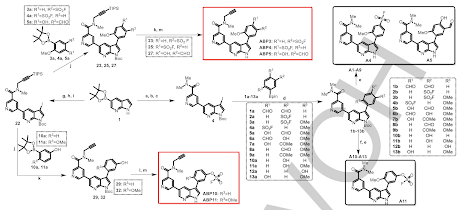Chen, P., Sun, J., Zhu, C., Tang, G., Wang, W., Xu, M., Xiang, M., Zhang, C., Zhang, Z., Gao, L. and Yao, S..Q.
Angew. Chem. Int. Ed. 2022
https://doi.org/10.1002/anie.202203878
Despite recent interests in developing lysine-targeting covalent inhibitors, no general approach is available to create such compounds. We report herein a general approach to develop cell-active covalent inhibitors of protein kinases by targeting the conserved catalytic lysine residue using key SuFEx and salicylaldehyde-based imine chemistries. We validated the strategy by successfully developing (irreversible and reversible) covalent inhibitors against BCR-ABL kinase. Our lead compounds showed high levels of selectivity in biochemical assays, exhibited nanomolar potency against endogenous ABL kinase in cellular assays, and were active against most drug-resistant ABL mutations. Among them, the salicylaldehyde-containing A5 is the first-ever reversible covalent ABL inhibitor that possessed time-dependent ABL inhibition with prolonged residence time and few cellular off-targets in K562 cells. Bioinformatics further suggested the generality of our strategy against the human kinome.

